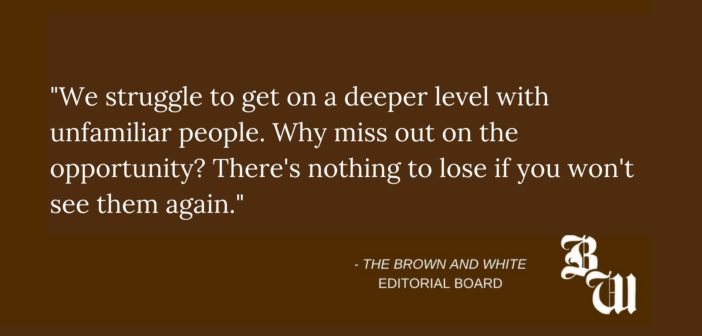Until you find your people, being vulnerable at college is terrifying.
Striking a balance between sharing personable and personal information is an art. Sharing too little comes off as disinterested. Opening up too early can oversaturate someone with emotion, pushing away potential friendships.
Telling a friend our innermost thoughts is therapeutic. It gives others a glimpse into our true selves, a reward for showing genuine care in another human’s experience.
But opening up comes with a risk.
Dear World, a portrait and storytelling project that has captured stories around the world, thrived off this risk at Lehigh. Sharing personal memories can be nerve-wracking as we watch our listener’s reaction, but Dear World provides a space where there’s no such thing as sharing too much.
Unfortunately, spaces like this are not the norm. The most impactful moments of our lives, when put on public display, can be shot down with a single statement.
“You’re too dramatic.”
Emotions are invalidated in seconds. We become wary of who we allow to access our inner thoughts. We retract and suppress our feelings further.
Being vulnerable is healthy. We shouldn’t opt out of the human experience. Without vulnerable spaces, we would never learn what our friends’ lives are actually like.
A boy whose mother is in distress. Sick family members, an aunt’s family needing somewhere to live. Four months ago, his mom’s biggest worry was her son studying abroad.
A girl who realized her parents were her inspiration. They came to America, following their dreams of fighting inequality. Their experiences made her who she is today.
A friend who accepted she was running from herself. Getting on a bus to a new life 650 miles away, learning after a week that it wasn’t the location of her school that made her unhappy. She dropped a eulogy for herself, written for a class assignment, on her desk and never looked back.
We have an innate desire to be heard and understood by others. There’s something special to gain in truly getting to know someone. Different social groups we involve ourselves in help introduce us to like-minded people who have their own unique story to share.
We struggle to get on a deeper level with unfamiliar people. Why miss out on the opportunity? There’s nothing to lose if you won’t see them again.
Use Dear World’s method. Try talking to new people. The less likely you are to see them again, the better.
When you tell a friend about something personal, it’s uncomfortable at first. You intentionally expose your vulnerability, laying out your most private moments, both positive and negative. Someone gains enough of your trust to be called a true friend.
When you tell a stranger, things are different. You won’t know what they think of you, of your problems, of your innermost thoughts. What you said in the exchange is the only thing that person knows about you. Maybe it’s all they’ll ever know.
Voicing your thoughts makes them real. Their vulnerable nature grants them legitimacy in the minds of others.
It would be nice to hear the stranger’s feedback, to let them delve into your subconscious and figure out who you really are. But the brief connection between two individuals stands alone. It’s pure in its ambiguity.
Whether or not you see the stranger again does not matter. Both parties leave with a unique understanding of each other — knowledge that someone cared enough about you to hear you out.
Connecting. Being vulnerable. Recognizing your emotions are valid, no matter the context.
Telling a story only you were present for. A story only you can tell.






Comment policy
Comments posted to The Brown and White website are reviewed by a moderator before being approved. Incendiary speech or harassing language, including comments targeted at individuals, may be deemed unacceptable and not published. Spam and other soliciting will also be declined.
The Brown and White also reserves the right to not publish entirely anonymous comments.